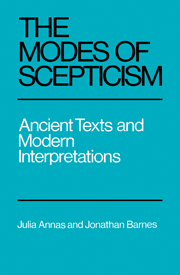Book contents
- Frontmatter
- Contents
- Preface
- Introduction
- 1 Sceptical Philosophy
- 2 Scepticism in Ancient Philosophy
- 3 The Ten Modes
- 4 Humans and Other Animals
- 5 Human Variations
- 6 The Senses
- 7 Circumstances
- 8 Places and Positions
- 9 Mixtures
- 10 Quantities
- 11 Relativity
- 12 The Common and the Rare
- 13 Customs and Persuasions
- Appendix A Philo and Diogenes on the Modes
- Appendix B The Eight Modes against Causal Explanation (Sextus, PHI 180–5)
- Appendix C The Five Modes of Agrippa (Sextus, PHI 164–9)
- Appendix D The Two Modes (Sextus, PHI 178–9)
- Appendix E Textual Notes
- Glossary
- Bibliography
- Index of People Referred to
- Index of Topics
1 - Sceptical Philosophy
Published online by Cambridge University Press: 06 January 2010
- Frontmatter
- Contents
- Preface
- Introduction
- 1 Sceptical Philosophy
- 2 Scepticism in Ancient Philosophy
- 3 The Ten Modes
- 4 Humans and Other Animals
- 5 Human Variations
- 6 The Senses
- 7 Circumstances
- 8 Places and Positions
- 9 Mixtures
- 10 Quantities
- 11 Relativity
- 12 The Common and the Rare
- 13 Customs and Persuasions
- Appendix A Philo and Diogenes on the Modes
- Appendix B The Eight Modes against Causal Explanation (Sextus, PHI 180–5)
- Appendix C The Five Modes of Agrippa (Sextus, PHI 164–9)
- Appendix D The Two Modes (Sextus, PHI 178–9)
- Appendix E Textual Notes
- Glossary
- Bibliography
- Index of People Referred to
- Index of Topics
Summary
What can we know about the world? How can we think and talk about it? Those two large questions determine two main areas of philosophy. Epistemology discusses questions of cognition: What is knowledge? How much can we know? Of what can we be certain? In what circumstances are our beliefs justified? Logic or philosophy of language is devoted to questions of meaning: What is it for us or our utterances to mean something? How can we refer to things in the external world? By what inferential processes can we legitimately move from one statement to another?
Among Anglo-Saxon philosophers, logic is now often taken to be the fundamental part of philosophy, and questions of meaning are accorded a certain priority: until we understand how we can talk and think about things we can make no progress. Such an attitude to philosophy is young. It traces its origins to the work of the German mathematician and logician, Gottlob Frege, whose active life spanned the period from 1880 to 1925.
Before the age of logic came the age of epistemology. For such thinkers as Descartes and Locke, Hume and Kant, the basic questions of philosophy concerned not language and thought but rather the nature and scope of human understanding. The first task of the philosopher was to determine in what ways and to what extent we can gain knowledge of the world. The triumph of logic has given a distinctive colouring to modern Anglo-Saxon philosophy: in style and approach, in method and argument, it differs noticeably from the philosophy of earlier epochs.
- Type
- Chapter
- Information
- The Modes of ScepticismAncient Texts and Modern Interpretations, pp. 4 - 9Publisher: Cambridge University PressPrint publication year: 1985
- 1
- Cited by



